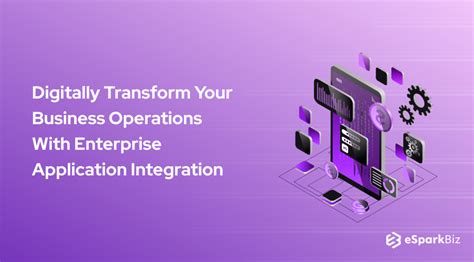In today's fast-paced business environment, companies are constantly seeking ways to streamline their operations, improve efficiency, and reduce costs. One effective way to achieve this is by implementing Enterprise Application Integration (EAI). EAI is a process that enables different applications, systems, and data sources to communicate with each other seamlessly, allowing businesses to respond quickly to changing market conditions and customer needs.

By integrating various applications and systems, businesses can eliminate data silos, reduce manual errors, and improve overall productivity. EAI also enables real-time data exchange, allowing companies to make informed decisions quickly. In this article, we will explore the advantages of Enterprise Application Integration and how it can benefit businesses.
Improved Efficiency and Productivity
One of the primary benefits of EAI is improved efficiency and productivity. By automating data exchange between different applications and systems, businesses can reduce manual errors, eliminate data entry duplication, and free up staff to focus on more strategic tasks. EAI also enables real-time data exchange, allowing companies to respond quickly to changing market conditions and customer needs.

For example, a company that implements EAI can automate the exchange of customer data between its CRM and ERP systems. This eliminates the need for manual data entry, reducing errors and improving customer satisfaction.
Enhanced Data Integration and Analytics
EAI also enables enhanced data integration and analytics. By integrating data from different applications and systems, businesses can gain a unified view of their operations, customers, and market trends. This enables companies to make informed decisions quickly, respond to changing market conditions, and identify new business opportunities.

For instance, a company that implements EAI can integrate data from its CRM, ERP, and supply chain management systems. This enables the company to gain a unified view of its operations, customers, and market trends, allowing it to make informed decisions quickly.
Reduced Costs and Improved ROI
EAI can also help businesses reduce costs and improve their return on investment (ROI). By automating data exchange between different applications and systems, companies can eliminate manual errors, reduce data entry duplication, and improve overall productivity. EAI also enables real-time data exchange, allowing companies to respond quickly to changing market conditions and customer needs.

For example, a company that implements EAI can automate the exchange of financial data between its ERP and accounting systems. This eliminates the need for manual data entry, reducing errors and improving financial reporting.
Improved Customer Satisfaction
EAI can also help businesses improve customer satisfaction. By integrating data from different applications and systems, companies can gain a unified view of their customers, respond to their needs quickly, and provide personalized service.

For instance, a company that implements EAI can integrate data from its CRM, ERP, and supply chain management systems. This enables the company to gain a unified view of its customers, respond to their needs quickly, and provide personalized service.
Real-Time Data Exchange and Analytics
EAI enables real-time data exchange and analytics, allowing businesses to respond quickly to changing market conditions and customer needs. By integrating data from different applications and systems, companies can gain a unified view of their operations, customers, and market trends.

For example, a company that implements EAI can integrate data from its CRM, ERP, and supply chain management systems. This enables the company to gain a unified view of its operations, customers, and market trends, allowing it to make informed decisions quickly.
Improved Collaboration and Communication
EAI can also help businesses improve collaboration and communication between different departments and teams. By integrating data from different applications and systems, companies can provide a unified view of their operations, customers, and market trends.

For instance, a company that implements EAI can integrate data from its CRM, ERP, and supply chain management systems. This enables the company to provide a unified view of its operations, customers, and market trends, allowing different departments and teams to collaborate and communicate effectively.





What is Enterprise Application Integration?
+Enterprise Application Integration (EAI) is a process that enables different applications, systems, and data sources to communicate with each other seamlessly.
What are the benefits of EAI?
+The benefits of EAI include improved efficiency and productivity, enhanced data integration and analytics, reduced costs and improved ROI, improved customer satisfaction, real-time data exchange and analytics, and improved collaboration and communication.
How does EAI improve customer satisfaction?
+EAI improves customer satisfaction by enabling businesses to respond quickly to changing market conditions and customer needs, provide personalized service, and gain a unified view of their customers.
In conclusion, Enterprise Application Integration (EAI) is a powerful tool that can help businesses streamline their operations, improve efficiency and productivity, and reduce costs. By integrating different applications, systems, and data sources, companies can gain a unified view of their operations, customers, and market trends, allowing them to make informed decisions quickly and respond to changing market conditions.
